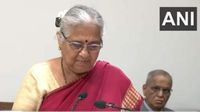In a recent interview on NDTV’s 'India Through the Eyes of Its Icons', Sudha Murthy, renowned author and philanthropist, candidly responded to her husband Narayana Murthy's controversial suggestion that young Indians should be prepared to work 70 hours a week. Sudha asserted that for passionate individuals, "time never becomes a limit for dedicated professionals." This statement reverberated within a country grappling with the balance between work and personal life.
Narayana Murthy, co-founder of Infosys and a prominent figure in India’s IT landscape, generated heated discussions in October 2023 when he suggested that the youth of today needed to embrace longer work hours to enhance productivity. His 70-hour work week suggestion ignited various reactions about the evolving expectations of work and the importance of work-life balance.
Sudha's perspective is deeply rooted in their shared journey. Reflecting on the early days of Infosys, she recounted how, at the beginning of his career, Narayana often worked upwards of 70 hours a week, driven by a vision and undeterred by the lack of financial resources. "There’s no magic wand that could make Infosys so large. It was sheer hard work, part of luck, part of the correct timing or being in the correct place," she emphasized, illustrating that the company's success was not contingent upon mere fortune but rather relentless dedication.
In delving deeper into the sacrifices involved, Sudha shared her role during those demanding years. As Narayana was occupied with his expanding enterprise, she took on the responsibilities of managing their home and raising their children. "I made that decision, and I also decided there was no point in complaining and telling your husband, 'Oh, you are not there,' because he’s doing a bigger job," she reflected. This admission underlines the importance of support within a partnership, showing how each person’s dedication can shape their collective journey.
Today, Sudha finds herself extremely busy in her own right, juggling her roles as a successful author, philanthropist, and politician, stating that she now currently works longer hours than her husband. "This balance, this mutual support, is what I call life. Behind every successful woman, there’s an understanding man, and vice versa," she remarked, emphasizing the necessity of partnership in achieving personal and professional goals.
Sudha also addressed the universal nature of time management. "God has given 24 hours to all, whether you are rich or poor, beautiful or ugly. How you want to spend it is left to you. And if you want to do anything passionately, it requires time. And if you are passionate about your work, then your partner should support it," she explained. Her message is clear: the way individuals allocate their time is a reflection of their priorities and passions, and having a supportive partner can bolster those pursuits.
Moreover, Sudha’s insights resonate with a broader range of professionals across various fields, from medicine to journalism, where long hours are often the norm in pursuit of excellence. She noted that such dedication is not exclusive to entrepreneurs, stating, "Professionals in various fields also commit long hours to excel in their careers." This observation serves to remind us that the path to success is paved with hard work across all professions.
Following Narayana’s remarks, an additional layer of controversy was introduced by L&T chairman S.N. Subrahmanyan, who suggested that employees should aim for a 90-hour workweek, even mentioning working on Sundays. His comments added fuel to the ongoing discourse about productivity and employee expectations in modern work culture.
As opinions on work hours continue to evolve, Sudha’s emphatic stance on passion and support brings a refreshing perspective to the conversation. Her emphasis on pursuing work with fervor, while recognizing the needs of a balanced family life, provides a nuanced view of success that transcends mere numbers and hours worked.
In an age where the definition of success is constantly shifting, the Murthy couple exemplifies how a blend of hard work, passion, and mutual support can lead to significant achievements, fostering a culture of dedication that's reflective of their journeys—one that values both ambition and balance. Sudha Murthy's words serve not only as an endorsement of her husband's views but also as a call for understanding the worth of time and the importance of nurturing relationships amidst relentless pursuits.
In conclusion, the dialogue surrounding Narayana Murthy's original suggestion, as framed by Sudha Murthy's reflections, pushes us to contemplate how we navigate our own 24 hours. Ultimately, it invites each of us to consider how passion, partnership, and perseverance intertwine to define our paths to success.








